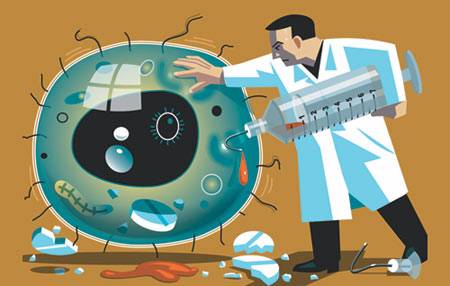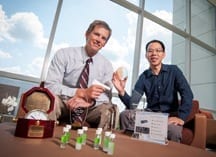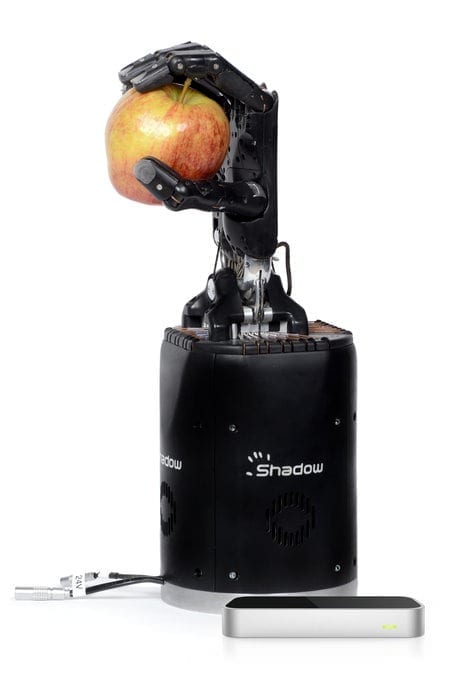
A treatment pioneered at the University of Pittsburgh Center for Vaccine Research (CVR) is far more effective than traditional antibiotics at inhibiting the growth of drug-resistant bacteria, including so-called “superbugs” resistant to almost all existing antibiotics, which plague hospitals and nursing homes.
The findings, announced online in the journal Antimicrobial Agents and Chemotherapy and funded by the National Institutes of Health, provide a needed boost to the field of antibiotic development, which has been limited in the last four decades and outpaced by the rise of drug-resistant bacterial strains.
“Very few, if any, medical discoveries have had a larger impact on modern medicine than the discovery and development of antibiotics,” said senior author Ronald C. Montelaro, Ph.D., professor and co-director of Pitt’s CVR. “However, the success of these medical achievements is being threatened due to increasing frequency of antibiotic resistance. It is critical that we move forward with development of new defenses against the drug-resistant bacteria that threaten the lives of our most vulnerable patients.”
Each year in the U.S., at least 2 million people are infected with drug-resistant bacteria, and at least 23,000 die as a direct result of these infections, according to the U.S. Centers for Disease Control and Prevention.
On the tail end of HIV surface protein, there is a sequence of amino acids that the virus uses to “punch into” and infect cells. Dr. Montelaro and his colleagues developed a synthetic and more efficient version of this sequence – called engineered cationic antimicrobial peptides, or “eCAPs”—that can be chemically synthesized in a laboratory setting.< The team tested the two leading eCAPs against a natural antimicrobial peptide (LL37) and a standard antibiotic (colistin), the latter being used as a last-resort antibiotic against multidrug resistant bacterial infections. The scientists performed the tests in a laboratory setting using 100 different bacterial strains isolated from the lungs of pediatric cystic fibrosis patients of Seattle Children’s Hospital and 42 bacterial strains isolated from hospitalized adult patients at UPMC.
The natural human antimicrobial peptide LL37 and the colistin drug each inhibited growth of about 50 percent of the clinical isolates, indicating a high level of bacterial resistance to these drugs. In marked contrast, the two eCAPS inhibited growth in about 90 percent of the test bacterial strains.
The Latest on: Antibiotic-Resistant Superbugs
[google_news title=”” keyword=”Antibiotic-Resistant Superbugs” num_posts=”10″ blurb_length=”0″ show_thumb=”left”]
via Google News
The Latest on: Antibiotic-Resistant Superbugs
- A mother's loss launches a global effort to fight antibiotic resistanceon May 9, 2024 at 5:33 am
In November 2017, days after her daughter Mallory Smith died from a drug-resistant infection at the age of 25, Diane Shader Smith typed a password into Mallory's laptop.
- Scientifically Speaking | The hidden pandemic that could eclipse Covid-19on May 2, 2024 at 11:11 am
Antibiotic-resistant superbugs pose a growing threat. This looming crisis demands urgent global attention and innovative solutions.
- Climate change risks fuelling antibiotic-resistant ‘superbugs’on April 28, 2024 at 5:00 pm
Simply sign up to the Climate change myFT Digest -- delivered directly to your inbox. Antibiotic-resistant “superbugs” are among the greatest public health threats of our age — and researchers fear ...
- Cats And Dogs Can Spread Antibiotic Resistant Superbugs To Ownerson April 27, 2024 at 10:55 am
Transfer of bacteria between sick pets and their humans may be contributing to antibiotic resistance, according to new research.
- Cats and dogs are spreading dangerous antibiotic-resistant ‘superbugs’ to their owners, study findson April 18, 2024 at 5:00 pm
Antibiotic-resistant superbugs kill over 1million people globally each year, with the World Health Organization warning the planet is heading for a “post-antibiotic” era. Projections show that ...
- Pets pass antibiotic-resistant 'superbugs' to humanson April 15, 2024 at 3:45 am
Dogs and cats can pass antibiotic-resistant bacteria to their owners ... a new study says. Cases of these "superbugs" being passed between sick dogs and cats and their healthy owners have been ...
- Antibiotic-resistant ‘superbugs’ are being passed from pets to humanson April 13, 2024 at 7:00 am
These "superbugs" become much harder to treat ... our pets might be contributing to the spread of antibiotic-resistant bacteria. The study, unveiled at the ESCMID Global Congress, discovered ...
- Pet owners warned over horror antibiotic-resistant superbugs that 'can jump from cats and dogs'on April 13, 2024 at 6:40 am
Antibiotic resistant superbugs can jump from cats and dogs to their owners, a new study has warned. Researchers have discovered evidence that multidrug-resistant bacteria is being passed from sick ...
- Antibiotic-resistant 'superbugs' from pets are being passed to ownerson April 12, 2024 at 3:27 pm
Cats and dogs harbour potentially deadly antibiotic-resistant superbugs that they can pass to their owners, a study suggests. Researchers warn the bacteria can spread between pets and healthy ...
- Warning As Dogs and Cats May Pass 'Superbugs' Onto Pet Ownerson April 12, 2024 at 3:00 pm
Our pets may be harboring antibiotic resistant bacteria, which may be passed on to their owners, fueling the persistence of these so-called superbugs. Our pets may be harboring antibiotic ...
via Bing News










